Ministry of the Environment presents future strategies to combat climate change
Environmental experts discuss the issues of implementing policies.
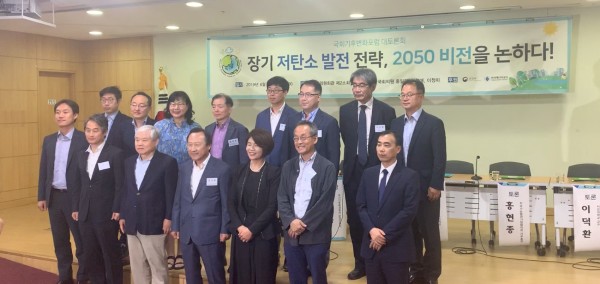
Intro:
In the midst of the rising concerns about climate change, on June 24th, the National Assembly Forum on Climate Change hosted a conference at the 2nd meeting hall in the National Assembly. The conference discussed the long term strategies on low-carbon emission for 2050.
First, it addressed the foundational knowledge of Korea's stance and strategies for the future environment which is led by Il-peo Hong, a member of National Assembly; Byung-ok Ahn, the operational director for National Climatic Environment Council; Jae-cheon Choi, an Ewha University professor; and Seok-tae Hwang, a member of National Assembly.
Then, a discussion was held between various figures with credible backgrounds: Dong-geun Lee, the president of The Korean Society of Climate Change Research; Duk-hwan Lee, a professor at Sogang University; Hyun-jong Hong, the Secretary-General for Korea Business Council for Sustainable Development; Jae-Gak Han, Chief for Energy & Climate Policy Institute; Jung-in Kim, a professor at Chung-Ahn University; Jung-sik Yoon, a JTBC reporter; and Seo-ok Choi, a school teacher at Kuksabong middle school.
With such discussions and presentations by a different variety of people, this forum offered the audience special insight and a wide perspective on the future of Korea’s environment.
Korea’s Position in Climate Change
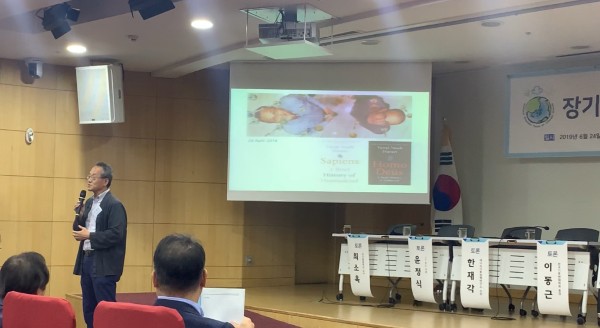
In the keynote address, Professor Jae-cheon Choi addressed the tragedy of neglected environmental responsibilities by the developed countries as those developing were the ones to face the detrimental effects. In response, global leaders established greenhouse gas(GHG) emission goals to abate the climate change effects with the plan to reduce the GHG growth levels by 2 degrees Celsius until 2050.
Choi pointed out that despite its well-established knowledge to combat climate change, South Korea fails to translate this vision into action and effort. In order to save the future generation, "sustainability is our main goal." Choi asserted.
Seok-tae Hwang presented the Ministry of Environment's roadmap for Korea's environmental goals and explicated the global trend in climate change. Hwang also included Korea’s Long-term low GHGs Emission Development Strategies-LEDS-along with a brief explanation of other countries’ strategies.
For LEDS in Korea, the Ministry plans to finalize their plan with the Forum until December and move forward the plan from the public and the government until the first half of 2020. Then, by the second half of 2020, they plan to submit it to UNFCC (United Nations Framework Convention on Climate Change).
Hwang, then, expounded that the government outlined two strategies to initiate active participation: a forum that includes the whole society into the discussion of low-carbon emission and an organization that researches technological advancements for the environment.
The operational director for National Climatic Environment Council Byung-ok Ahn further imparts background information on the status quo for other nations. For instance, he reports that Australia’s and Japan’s environmental issues and response to environmental problems. Each nation faces specific environmental problems such as Australia’s marine conservation. Thus, he emphasizes the fact that we must have a specific “survival” tactic against the forthcoming climate change for Korea.
Perspectives on How Climate Change Should be Responded
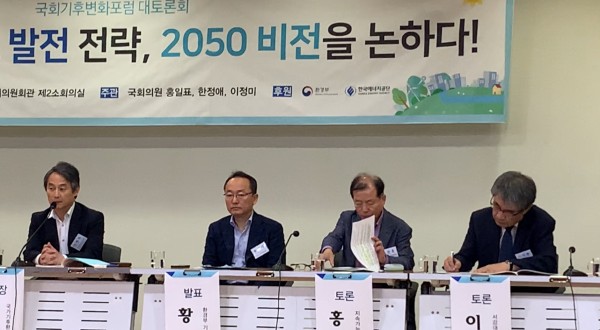
Dong-Geun Lee proposed that the problem of climate change should be solved in a collective process; furthermore, the value of "co-benefiting" must be considered, insinuating that all types of pollution are connected. Jong-sik Yoo accorded to this idea: “Connecting the problem of fine dust and climate change" will elicit a more active response.
However, Duk-hwan Lee disagreed. The magnitude of accuracy that proves the importance of "co-benefit" has not been confirmed. It is possible that future extinction may not be at odds with climate change. Before advocating the need for "collectivity," the government must confirm the validity of this relationship.
Role of the Press
JTBC Reporter Jong-sik Yoon accounted few anecdotes to signify the press's lack of concerns on climate change. Due to the press's sole focus on fine dust, the public lacks knowledge and awareness on climate change, treating it irrelevant. He accounted, "when I did a report on fine dust and did not include any information about China, the comment section was replete with criticism, asking why China is not blamed.”
The public's vulnerability to misconception-which derives from fake news could be also seen in its stance on renewable energy. Many people believe it to be "financially overwhelming" or "ineffective" for Korea. Yoon conceded that factors of geographical features may come to conflict of interest.
To give another example of Korea’s awareness of climate change, Duk-hwan Lee pointed out that wrong phrases have been thrown around. Lee states that “reducing carbon dioxide" is scientifically inaccurate; instead, it should be formulated as "reducing carbon dioxide emission from GHG."
Role of the Government
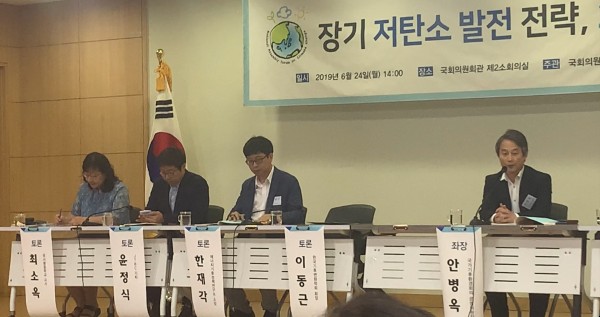
However, the causes of inaction towards climate change should not solely be blamed by the press,but also the government itself. Most of the speakers accorded to the fact that Korea fails to translate its vision to action.
Jae-guk Han reported that there have been several times when the government, without any supporting reasons, nullified policies that were to be initiated. Furthermore, the Ministry of Environment is a weak political sector, having a small voice to its decisions. On the other hand, the Ministry of Food and Agriculture holds more power, disregarding environmental concerns in their decisions.
This political balance goes against the future model of society. Hyun-jung Hong delineated that industries that commit to a long-term environmental plan will be the ones that will thrive and succeed. For instance, the World Business Council for Sustainable Development already established a roadmap that will respond to the environmental changes for the future.
Matter of Youth Education
Perhaps most importantly, the Forum's main purpose of this discussion was to address the environmental education for the youth. Because Korea is already faced with misconception and overlooked responsibilities, environmental education will be necessary to change this trend of ignorance.
However, Seo-ok Choi addressed the difficulty of implementing environmental education. Due to Korea's tightly scheduled education, Korean students, unlike those from Europe and the United States, have the least amount of opportunities to learn about the environment.
In such conflicting values, Jung-in Kim propounded that social media platforms would facilitate the process of raising awareness on climate change. Still, it seems like a more tentative program is needed for Korean students.
Conclusion
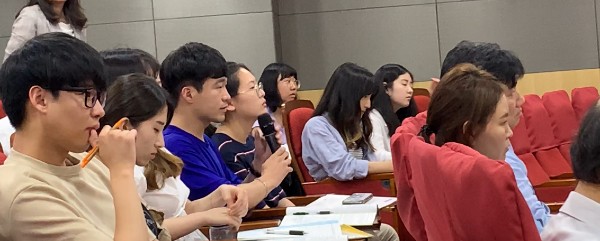
The Q&A section with the audience sparked further differentiating perspectives such as following Europe's model of renewable energy or difficulty of unifying energy policies due to special geographical features. However, many of these conflicting ideas were quickly shut down due to lack of time.
Throughout the forum, several important topics were discussed: the Ministry's plan for climate change, various considerations to instill this new vision, criticism of the press, the government's inaction, and youth education. While the forum functioned as an introduction to the Ministry's future policies and goals, it also demonstrated various perspectives on what values should be focused when responding to climate change.
The forum was held as an introduction to what the Ministry will do in the future, yet it could be interpreted into two ways: another "vision" without any action or a new declaration that inspires genuine "efforts" against climate change.

